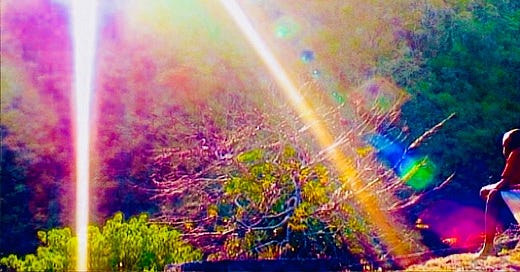Goddess Nuwa embraces heaven, earth, and everything in between.
When the sky leaks, Nuwa summons 36,501 five-colored rocks to repair it. Ultimately, she uses only 36,500 and disposes of the supernumerary stone beneath Ching-keng Peak.
The remaining stone toils tirelessly, transforming into a sentient, quasi-anthropomorphic being.
With his consciousness, comes the pain of realizing he is useless to the goddess and his subsequent abandonment. Sorrows and shame stack up, overwhelming him.
Stone begins to see himself as a mistake.
Self-doubt gnaws away at his confidence.
While he is drifting and lamenting one afternoon, a Buddhist monk and a Daoist prelate stroll toward him, conversing.
After overhearing the two reminiscing about the prosperity of the sublunary world, Stone is sorely tempted to partake in the sensual delights they have described so vividly. He begs them to help him descend to earth.
Having unwittingly enticed Stone, the Buddhist and the Daoist try to warn him of the transient and illusory nature of earthly pleasures. Their words, however, are ignored.
Stone is determined to seek fulfillment amid the mortals.
Thus does the curtain rise on my all-time favorite – The Dream of the Red Chamber or The Story of the Stone – one of the four great Chinese classical novels.
I read the simplified version of Dream when I was ten, identified immediately with Stone, and heard his message to me:
‘You are not alone. You are not useless.’
At fifteen, I left my old life behind, and explored my personal values elsewhere, alone.
Now in my late forties, I thank Stone, who elevated that fifteen-year-old from despair.
And I thank the younger me for daring to depart and reinvent herself. It would have been much easier to succumb to depression, and perceive my life as a mistake.
A Mistake by Chouyu Zheng comes to mind.
A renowned Taiwanese poet from the 60s and 70s, Zheng’s Mistake is one of my favorite contemporary Chinese poems.
Here is my translation of the closing.
‘The tapping sound of my hoof is a beautiful mistake.
I am not a homecomer, only a passerby.’
This final line speaks to me, as I have led a nomadic life.
Am I a homecomer to Hong Kong, or only a passerby?
That is the question I imagine many long-term city dwellers share with me, every time they leave and come back.
Sometimes, it feels like a mistake to return, or to pass by again.
I wrote this poem after Zheng.
Xerces Blue
Like a Xerces Blue,
will you be extinct, too?In this pragmatic land,
a new chapter has begun
with yes-men-and-women,
a unified team – one narrative.Wanting to come back,
you look for reasons to stay,
but have nowhere to land;
no place to call home.With delicate wings,
you fly into the foggy sky.Trying to be strong,
you seek ways to remain,
but are no match for politics;
no weight to your words.With gossamer wings,
you fly into the western wind.The flapping sound
is a beautiful mistake.Like Xerces Blue,
you may never return, too.
Stone did find fulfillment on earth, but unconventionally, and returned to heaven.
I am still toiling. When life gets hard, I take a long walk, preferably by the sea. At various times, I lift my head, embrace the rosy dawn, the afterglow, the turquoise blue, or the rainbow – the result of the five-colored rocks Goddess Nuwa used to repair the sky – and walk on.
Sonia Leung, a Hong Kong-based writer and poet, is the author of Don’t Cry, Phoenix (2020), a bilingual (English and Chinese) poetry collection. Sonia won awards for both her prose and poetry, including Wordview 2023, Hong Kong’s Top Story 2015 and 2016. Her work has appeared in literary journals and anthologies worldwide (www.soniaflleung.com). Sonia’s second book, The Girl Who Dreamed – A Hong Kong Memoir of Triumph against the Odds, will be available in March 2024. She is exploring publication opportunities for her third book, Three-inch Heaven, a collection of personal essays and short stories reflecting Chinese women’s lives.





